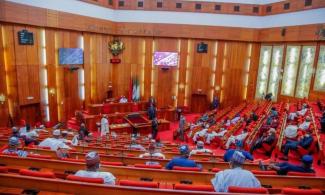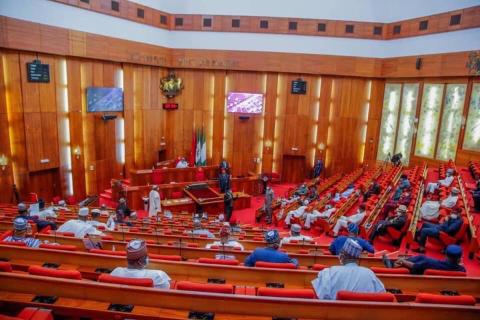
The Convener, Free Nigerian Movement ( FNM ), Raphael Adebayo, said the lawmakers are entitled to go on recess as enshrined in their standing rules but described it as untimely.
Human rights activists have taken a swipe at Nigerian lawmakers for refusing to expedite action on the passage of major bills of national importance.
The Nigerian Senate and House of Representatives had last week Thursday suspended plenary for eight weeks to enable lawmakers to embark on their annual recess despite criticisms.
The lawmakers will resume on September 15.

The Convener, Free Nigerian Movement ( FNM ), Raphael Adebayo, in an interview with SaharaReporters said the lawmakers are entitled to go on recess as enshrined in their standing rules but described it as untimely.
He said the lawmakers ought to have considered some significant bills that required attention before embarking on the vacation.
He said, "In the meantime, I will also suggest that Nigerians make it their responsibility to continue to put pressure on these legislators in their homes.
"It would have been better if the lawmakers had postponed their recess and attended to the electoral reform amendment bill which the whole Nigerians are yearning for.
"Also, this will make them realise that Nigerians are not happy, particularly those anti-people bills, such as social media and hate speech bills, which the citizens have rejected.”
On his part, the Executive Director, Civil Society Legislative Advocacy Center (CISLAC), Auwal Musa Rafsanjani, said members of the National Assembly must develop a framework for constituency engagement and consultation to ensure full participation of the electorate in legislative activities.
Rafsanjani said the delay in the passage of PIB would expose the nation's oil and gas sector to recurring lapses and monumental loss of revenue.
"The delay would pave the way for secrecy, discretionary in-licensing and tender processes and discourage independent regulators insulated from political interference.
"It will also encourage discretionary powers to the President and Minister of Petroleum, exacerbate the lingering challenges of gas flaring, environmental protection, remediation and restoration," he said.
On the Electoral Act, Rafsanjani said the nation's electoral process would continue to be characterised by violence of various kinds if something was not done.
About 5,000 Nigerians had signed an online petition on Change.org, urging the lawmakers to halt the planned recess and give priority to the passage of some major bills before the Senate.
Some of the bills include Bill to Amend the Electoral Act (No.6) 2010 and other Related Matters, 2019 and Petroleum Industry Bill (PIB). PIB is the oldest bill in the history of Nigeria since it was introduced in 2008.
The petition was initiated by the Center for Liberty (CFL), a non-governmental organisation advocating electoral reforms, democratic governance and social change in Nigeria.
The Electoral Act (No. 6) 2010 bill, sponsored by the Deputy President of the Senate, Ovie-Omo Agege, was passed for second reading, in March 2020.
Senate President Ahmad Lawan last year said the upper legislative chamber would ensure the full passage of the Petroleum Industry Bill (PIB) before the end of 2020.
SaharaReporters recalled that the lawmakers recently expedited action on a bill seeking immunity from prosecution for current members of the federal legislature.
The bill, which was sponsored by Odebunmi Olusegun, representing Surulere/ Ogoluwa Federal Constituency of Oyo State, seeks to alter Section 308 of the constitution of the Federal Republic of Nigeria, 1999.
It was supported by the majority of the lawmakers who insisted that it was essential to safeguard the sanctity of the National Assembly.